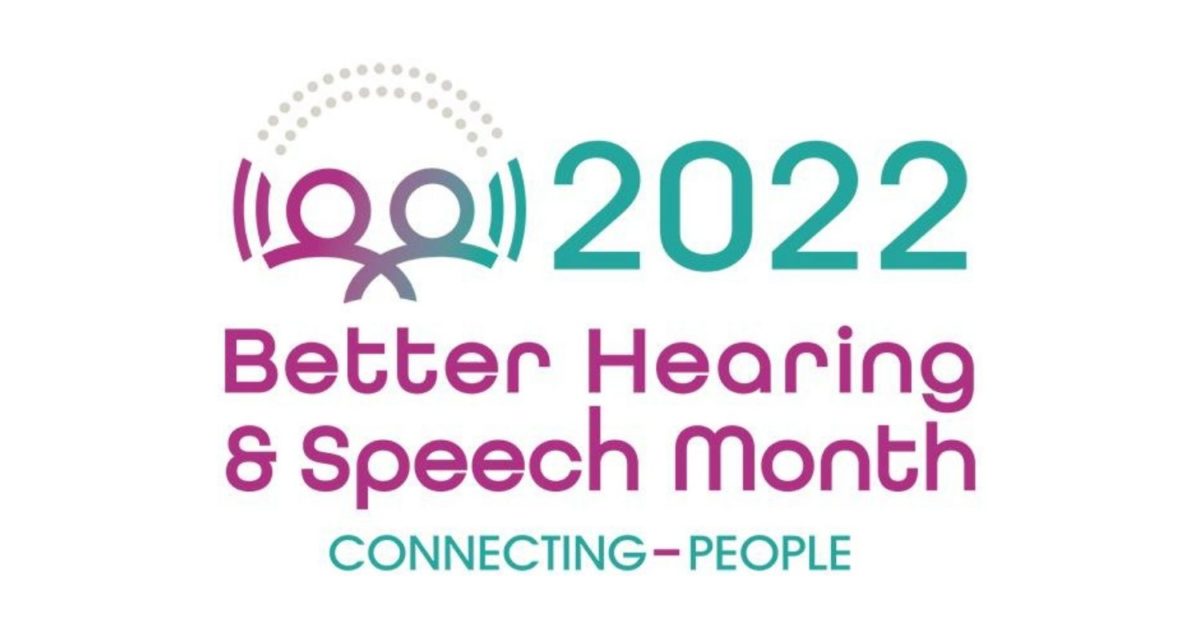- As an Invisible Condition, Hearing Loss Often Goes Ignored - October 17, 2022
- All About Assistive Listening Devices & More - October 1, 2022
- Tired of Loud Restaurants? Time for a Hearing Test! - September 17, 2022
It’s May again, and that means it’s Better Hearing and Speech Month! Each year, the American Speech-Language-Hearing Association (ASHA) celebrates Better Hearing and Speech Month (BHSM) to spread awareness of hearing loss and other speech-language disorders. Whether you’re concerned that you or someone you love may have hearing loss, or you just have questions about hearing loss or hearing protection, now is the time! BHSM is a great reminder to do some research and schedule a hearing test!
Connecting People
Every year, ASHA chooses a theme for BHSM, and this year it is “Connecting People.” Sometimes when we think of hearing loss or speech disorders, we can get a bit into the weeds of the particulars and think about the associated health problems or long-term concerns about brain functioning. While these are certainly important, at its root, treating hearing loss is really about maintaining the connections we have with others—and the possibility to make new connections.
When we maintain our connections to others, life is full of possibility. Whether it’s catching a word from a stranger, or putting our attention toward something our spouse has just said, daily conversation is full of serendipity. That excitement of chance and anticipation can be one of the greatest joys in life! Yet often our hearing ability declines so slowly that we don’t necessarily see ourselves missing out on all this good stuff. We might realize that something is different, but we might not realize that it is specifically that we miss the excitement contained in miniscule interactions throughout the day.
In fact, most people who get hearing aids point out how their relationships improve afterward. Whether or not we verbalize it often, one of the main things—perhaps the main thing—we appreciate in our relationships is the feeling of being understood. Hearing loss is one of the biggest barriers to feeling understood that there can be, and it works as a two-way street. Hearing loss doesn’t just affect the person who has it, but everyone they’re close to, as well. All parties may feel a sense of loss as hearing loss makes it harder to communicate. A good set of hearing aids can help us hear our loved ones with ease once again, and help not only us but also them to feel more understood.
Modern Hearing Aids and Connection
If you haven’t kept up with hearing aid technology over the years, it may be a good time to take another look. There have been incredible innovations in hearing aid tech over the last couple decades, and even the last few years!
Modern hearing aids don’t just amplify sound to make up for your hearing loss. Nearly all hearing aids now employ powerful computers that can reduce background noise while amplifying speech. That makes it a lot easier to have a conversation in a restaurant or cafe, or any other busy environment. Some hearing aids on the market can do this so well that speech intelligibility in noise can be improved to better than that of normal hearing.
In addition to helping us focus on the desired sound around us, hearing aids can help us connect to others even across oceans! Wireless Bluetooth connectivity is near-standard in hearing aids today, which lets you connect your hearing aids to your smartphone, tablet, TV, and more to stream phone calls, video conferences, and media directly to your hearing aids. That improves fidelity significantly, and lets you use your hearing aids much like a set of Apple Airpods™ or other “wearables.”
Regular Hearing Tests
ASHA stresses that even if you don’t currently have problematic hearing loss, it’s important to have a relationship with a hearing care provider. Hearing health is a lifelong proposition, as we must consider prevention as well as treatment. Getting regular hearing tests helps you identify hearing loss before you notice that you have it, so you can take steps to try to prevent further hearing loss going forward.
ASHA suggests that everyone should have their hearing tested at least once per decade until age 50, and once every three years after that. Those at a higher risk for hearing loss due to hazardous occupations or hobbies should be tested even more frequently.
By getting your hearing tested regularly, your hearing care provider can track your hearing health over time and suggest anything to watch out for going forward. In the event that you do have hearing loss that should be treated with hearing aids, it is crucial to start wearing them as soon as they are recommended to prevent complications of untreated hearing loss.

